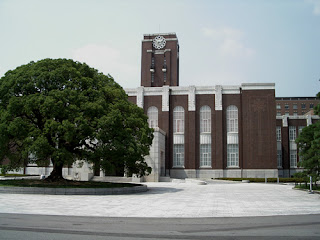Kyoto University
Kyoto University (京都大学 Kyōto daigaku?), or Kyodai (京大 Kyōdai?) is a national college situated in Kyoto, Japan. It is the second most established Japanese university, one of the most astounding positioned colleges in Asia and one of Japan's National Seven Universities. One of Asia's driving examination situated foundations, Kyoto University is renowned worldwide for creating world-class analysts, including ten Nobel Prize laureates, two Fields medalists and one Gauss Prize.
The precursor of the Kyoto University was the Chemistry School (舎密局 Seimi-kyoku?) established in Osaka in 1869, which, regardless of its name, taught material science too. (舎密 is a translation of a Dutch word chemie.) Later, the Third Higher School (第三髙等學校 Daisan-kōtō-gakkō?) was set up in the spot of Seimi-kyoku in 1886, it then exchanged to the college's available primary grounds around the same time.
Kyoto Imperial University (京都帝國大學 Kyōto-teikoku-daigaku?) as a piece of the Imperial University framework was set up on June 18, 1897, utilizing the Third Higher School's structures. The higher school moved to a patch of area right over the road, where the Yoshida South Campus stands today. Around the same time of the college's foundation, the College of Science and Technology was established. The College of Law and the College of Medicine were established in 1899, the College of Letters in 1906, growing the college's exercises to zones outside regular science.
After World War II, the present Kyoto University was built up by combining the royal college and the Third Higher School,
which accepted the obligation of showing aesthetic sciences as the Faculty of Liberal Arts (教養部 Kyōyō-bu?). The personnel was disintegrated with the establishment of the Faculty of Integrated Human Studies (総合人間学部 Sōgō-ningen-gakubu?) in 1992.
Kyoto University has subsequent to 2004 been consolidated as a national college partnership under another law which applies to every national universitie.
Notwithstanding the fuse which has prompted expanded budgetary freedom and independence, Kyoto University is still mostly controlled by the Japanese Ministry of Education (文部科学省 Monbu-kagaku-shō?).
The college was positioned third in 2008 and 2010 in the positioning "Really Strong Universities" by Toyo Keizai.In another positioning, Japanese private academy Kawaijuku positioned Kyodai as the second best college in Japan.
Kyodai is likewise one of the top colleges on the planet. The accompanying rankings are the case of Kyodai's positioning positions on the planet rankings.
*Kyoto University was positioned 24th on the planet in the 2010 Academic Ranking of World Universities
*eleventh worldwide in the Global University Ranking.
*A human intensity list and investigation by the Human Resources and Labor Review, and distributed in Chasecareer Network, positioned the college 24th globally and second in Asia for 2010.
*QS World University Rankings in 2011 set Kyoto University 32nd in general on the planet, one behind University of Melbourne, seven spots lower than the earlier year.
*The 2011 QS Asian Rankings make Kyoto University the seventh most noteworthy positioned college in Asia, the most noteworthy being The Hong Kong University of Science and Technology.
Research execution
Kyodai is typically considered as one of the top exploration establishment in Japan. Truth be told, the second biggest measure of venture from Grants-in-Aid for Scientific Research, which is the national gifts program for exploration foundations.
This monetary backing from the Japanese government directly
affects Kyodai's examination results. As indicated by Thomson Reuters, Kyodai is the first best research college in Japan.[10] Its exploration greatness is particularly unmistakable in Chemistry (first in Japan, fourth on the planet), Biology and Biochemistry (second in Japan, 23rd on the planet), Pharmacology and Toxicology (second in Japan,30 on the planet), Immunology (third in Japan, 25th on the planet), Material Science (fourth in Japan, 22nd on the planet), and Physics (fourth in Japan, 25th on the planet).
In another positioning, Nikkei Shimbun on 2004/2/16 overviewed about the exploration benchmarks in Engineering studies taking into account Thomson Reuters, Grants in Aid for Scientific Research and surveys to the heads of 93 driving Japanese Research Centers. Kyodai was put in the tenth position (examination arranging capacity sixth) in this positioning.
Kyodai additionally has a high research standard in Social Sciences and Humanities. Repec in January 2011 positioned Kyodai's Institute of Economic Research as Japan's third best monetary exploration foundation. Kyodai has given 6 presidents of the Japanese Economic Association in its 42-year history, which is the third biggest number.
Kyodai graduated class are unmistakably fruitful in Japanese commercial enterprises, for example, demonstrated as follows.
As indicated by the Weekly Economist's 2010 rankings, moves on from Kyodai have the tenth best business rate in 400 noteworthy organizations in Japan. On the other hand, it must be noticed this lower positioning position is a direct result of the extensive number of graduated class who get to be government officials, which is second biggest among Japanese colleges. Truth be told, graduated class of Kyodai's normal compensation is the fifth best in Japan, as indicated by the PRESIDENT.
Mines ParisTech : Professional Ranking World Universities positions Kyodai as fifth on the planet in 2011 as far as the quantity of graduated class recorded among CEOs in the 500 biggest overall organizations.










0 comments:
Post a Comment